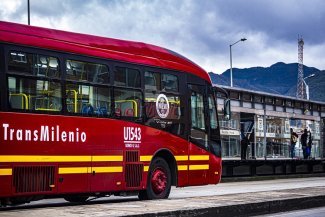
In this 11 September 2021 photo, Rogelio Oliva stands beside his traditional diesel jeepney which he drives along the Baclaran-Nichols route in the Metro Manila area. He is reluctant to switch to an electric jeepney, as mandated by the government, because of the increased cost of upkeep and maintenance.
In 2008, the Philippines passed the landmark Renewable Energy (RE) Act, which aimed to reduce the country’s carbon emissions and harness its local energy sources. The law was designed to attract private investors through tax incentives to explore the rich natural energy sources in the Philippines, mostly hydrothermal, solar, wind, biomass and ocean energy.
However, today the Philippines remains deeply committed to coal. At the United Nations Climate Change Conference of Parties (COP26) which is currently taking place in Glasgow, Scotland, the Philippines has committed to reduce harmful greenhouse gases by 30 per cent by 2040. But this new target for its Nationally Determined Contributions (NDCs) is a retreat from the government’s original pledge to cut emissions by 70 per cent by 2030.
Coal accounts for nearly half of the Philippines’ energy mix, and is forecast to increase to 59.1 per cent by 2028, despite the government issuing a moratorium on new coal-fired power plants in October 2020. In addition, there are currently 28 coal-fired power plants operating throughout the Philippines, with a further 22 approved by the Department of Energy (DoE) in line with its Philippine Energy Plan (PEP) 2018-2040, which aims to support President Rodrigo Duterte’s ambition to transform the Philippines into a “prosperous, predominantly middle-class society by 2040” by increasing the production of clean sources of local energy, decreasing the wasteful utilisation of energy, and ensuring “the balance between the provision of reliable and reasonably priced energy services, support for economic growth, and protection of the environment”.
For those advocating for the (increased) use of coal, economic development and poverty reduction in line with the Sustainable Development Goals is impossible without fossil fuels. But climate campaigners fear that the PEP is incongruous with the country’s commitments under the Paris Agreement.
How did the Philippines go from being an early leader in renewable energy to having a long-term power policy that takes it off what had been a promisingly green trajectory? According to Greenpeace Philippines campaigner Khevin Yu: “The country’s vested coal interests, erratic policy shifts, and political bottlenecks hinder the transition to a low-carbon pathway. We still have a workable chance to be on track with our commitments, but DoE must be more ambitious on RE with its energy plan for 2018-2040, and rally energy companies to shift away from coal.”
For Vicente Posada Unay Jr., secretary general of the National Union of Workers in the Power Industry (Power), an affiliate of the national trade union centre Sentro, part of the problem lies in the government’s failure to engage properly with stakeholders outside of policy circles and the business community: “The [RE] law does not provide a process for social dialogue or consultation with workers and communities, so there is no just transition to the renewable energy strategy.”
For Unay, decarbonisation must engage everyone – from workers in polluting industries to consumers, from local communities to local governments – in order to prevent negative impacts on people and the environment. Without engaging workers in a meaningful way, the government’s stated climate ambition cannot be attained, he says. “The science of climate chance must be understood by workers, so that they can actively participate in the just transition.”
When transition isn’t just: the case of the jeepneys
One of the measures introduced in the attempt to achieve the country’s climate ambitions while providing safer, cleaner, healthier and more fuel-efficient transport for Filipino commuters has been the phasing-out of jeepneys, a popular mode of public transportation since the American occupation in the 1900s. In 2017, the government introduced the Public Utility Vehicle Modernization Program (PUVMP), aimed at achieving an environmentally sustainable public transport sector by replacing all diesel-powered jeepneys older than 15 years with electric vehicles.
The measures were expected to impact approximately 200,000 drivers, many of whom felt that the enormous costs involved made the modernisation scheme “anti-poor”. According to Joshua Mata, secretary general of Philippine trade union centre Sentro, while workers are not opposed to the shift to clean energy, “affected workers, such as drivers, must be supported through subsidies and easy loans,” which is something the 2017 plan did not provide for. The National Confederation of Transport Workers’ Union (NCTU), a Sentro affiliate, tried to appeal the decision but the government refused to negotiate. As a result, NCTU members launched a series of strikes and protests starting in October 2017, which crippled transport operations in major cities across the country.
Following the strike action, Sentro assisted the NCTU to form transport cooperatives which negotiated soft loans worth Php 160,000 (approximately US$3,200) per person to help jeepney drivers make the shift to electric vehicles. However, this transition has been beset with issues. Drivers and transport cooperatives complain of the lack of enabling environment (the difficulty accessing charging stations, no services centres that repair e-jeepneys, etc.) and as well as the high cost for these electric vehicles (approximately Php 800,000 to 1,200,000/US$15,700 to US$23,600). Drivers also have to shoulder additional expenses such as maintenance costs and expensive battery replacements.
In addition, after more than 18 months of lockdowns in the Philippines [editor’s note: the Philippines implemented one of the world’s strictest stay-at-home orders in a bid to halt the spread of Covid-19], the families of jeepney drivers, mostly from the Metro Manila area, are among the informal workers who have been battling poverty and hunger alongside the coronavirus. Many drivers have resorted to begging in the streets for food, while some have turned their jeepney units into makeshift homes after being kicked out of their apartments due to loss of income.
Rogelio Oliva, 49, has been driving jeepneys for two decades and is refusing to shift to an e-jeepney due to increased maintenance costs.
“Before the pandemic, I used to earn more than Php1,000 (approximately US$20) daily for 10 to 12 hours of driving. Now my income is down to Php500 (approximately US$9.80) because there are not enough passengers. If I shift to driving an e-jeepney, my earnings will be even less.”
Oliva says that colleagues who shifted to e-jeepneys now face hardships due to the additional cost of running these vehicles. They have to pay Php1,500 monthly (approximately US$29.50) in battery charging fees and have to charge their vehicles for at least two to three hours before they can hit the road. He also notes that while Manila is increasingly prone to flooding, the engines of e-jeepneys cannot survive the city’s water-logged streets. “The government must provide us with better alternatives such as maintenance subsidies if we are to make the shift to e-jeepneys otherwise we won’t be able to earn a decent income for our families,” he says.
“There can be no just transition without worker representation”
The climate emergency is more than a talking point in the Philippines. As one of the countries most prone to natural disasters, it is one of the places most at-risk from climate change, with impacts ranging from an increasing number of tropical cyclones, flooding and landslides to above-average rates of sea-level rise.
A country of 7,641 islands, the Philippines is hit by an average of 21 typhoons every year, at least five of which are destructive. In 2020, one of the world’s most powerful tropical cyclones – Super Typhoon Goni (Rolly) – killed 32 people in the Philippines and caused an estimated US$415 million worth of damage. Meanwhile, 2013 marked the year when Super Typhoon Haiyan, one of the deadliest typhoons on record, killed at least 6,400 people across the country.
During Super Typhoon Rolly in November last year, damage to the power supply in the island province of Catanduanes reached more than Php 120 million (approx.US$2.36 million). However, the National Electrification Administration (NEA), the government agency tasked with supporting the electric cooperatives that supply electricity in rural areas only provided Php 20 million (approx. US$395,000) worth of loan assistance, forcing workers to take out more expensive commercial loans.
The Power union has been assisting workers in 24 electric cooperatives across the country to negotiate collective bargaining agreements (CBAs) for the sustainability of operations, particularly during natural disasters. The CBAs also seek to protect workers’ security of tenure, in the event that the cooperative shifts to renewable energy.
Unay says that Sentro continues to engage with government officials from the environment and energy departments that sit on the National Renewable Energy Board to convince the government to stop accommodating applications for new coal-power plants. In 2019, the union also initiated a pilot study on the impact of the shift to renewable energy by the Masbate Electric Cooperative (Maselco) in Masbate province. But the project has been postponed due to the pandemic.
Trade unions also continue to engage the Technical Education and Skills Development Authority (TESDA) in the implementation of 2016 Green Jobs Act that provides for the retooling and upskilling of workers in the manufacturing, agriculture, and services sectors. The Act also seeks to encourage companies to generate and sustain green jobs by providing businesses with tax relief and duty-free importation of capital equipment used in the promotion of green jobs.
“Trade unions are the biggest structures, and they have the political strength to move the government to act on climate justice,” says Mata of Sentro. Julius Cainglet, vice president for education, research and partnership at the Federation of Free Workers (FFW), says trade unions need to be better engaged by the government, particularly in relation to the Climate Change Commission (CCC, the sole policy-making body tasked with monitoring the implementation of measures linked to the country’s climate commitments as outlined in the Paris Agreement).
Cainglet notes that while Filipino workers have played an important role in the global efforts to reach the climate targets, at the national level Filipino workers are side-lined in crucial climate meetings. “There can be no just transition if there is no worker representation in the Climate Change Commission,” says Cainglet.
Young climate activists are also calling for better representation on the CCC. Young people are invited to consultations as observers but they are not given the chance to provide inputs. “I hope the government can seriously consider the voice of the youth on climate change and adopt our inputs for action,” says Mitzi Jonelle, campaign coordinator for Youth Advocates for Climate Action Philippines (YACAP) and lead organiser of the Fridays for Future mass rallies of students and young people across the Philippines, inspired by the Swedish environmental activist Greta Thunberg.
But campaigning for climate justice can be extremely dangerous in the Philippines. According to the London-based human rights group Global Witness, in 2019, the Philippines ranked as the second most dangerous place to live for land and environment defenders, with 43 killings. Jonelle herself has been ‘red-tagged’ – a practice where activists are blacklisted, targeted by the police and military, and maliciously labelled as ‘communists’ and/or ‘terrorists’ for taking a critical stance against the government – even though the work of YACAP is peaceful, such as developing modules on climate change for schools and providing climate education to farmers and women’s groups. “It’s frightening,” says Jonelle of being red-tagged, “but I am also indignant about such accusation. The fight for climate justice is no longer about the environment: our lives are also at stake.”









